
Regency Anglo-Indian Sadeli Workbox, Early 19th Century, Ivory Inlay
A Regency Anglo-Indian sadeli workbox, early 19th century, the shaped box finely inlaid with ivory and sadeli mosaic, the fitted interior with sadeli decorated spools and compartment lids, 12 cm high, 31.5 cm wide, 23 cm deep

Anglo-Indian Vizagapatam Geometric Inlaid Wood Box and Cover
Anglo-Indian Vizagapatam box and cover, of rectangular form, the cover inlaid with a series of square panels displaying fine inlaid geometric work in differing woods, bone and mother of pearl, 6 cm x 23 cm x 14 cm

Anglo-Indian Vizagapatam Box with Intricate Geometric Inlay Design
Anglo-Indian Vizagapatam box and cover, of rectangular form, the central panel set with two finely inlaid hexagonal panels displaying geometric motifs, surrounded by multiple geometric borders, 4 cm, 25 cm, 15 cm
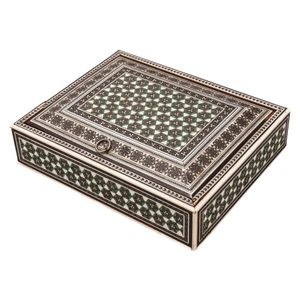
Indian sadeli spice box with intricate geometric inlay design, cover
Fine Indian sadeli spice box and cover, of slender rectangular form, finely inlaid with a series of fine repeating geometric motifs, the inset cover opening to reveal small covered compartments, 3.5 cm, 11 cm, 14 cm

Anglo-Indian Ivory and Tortoise Shell Vizagapatam Box, c.1930
Anglo-Indian ivory and tortoise shell veneer Vizagapatam box and cover, c.1930, of rectangular form, decorated with central panel displaying carved and incised floral scroll, on a tortoise shell ground, with strap work, opening to velvet covered interior,…

Exquisite Shell and Mosaic Card Cases Trio
A mother of pearl and paua shell card case, a sadeli mosaic card case and a celluloid card case (3)

Anglo Indian Sadeli Mosaic Sandalwood Trinket Box, CITES Permit Required
An Anglo Indian sadeli mosaic inlaid sandalwood trinket box, *CITES permit May be required for export, width 15 cm

Anglo-Indian Sadeli Mosaic Sandalwood Glove Box, 19th Century
A late 19th century Anglo Indian sadeli mosaic inlaid sandalwood glove box, *CITES permit May be required for export, width 28 cm

19th Century Anglo-Indian Teak Campaign Chest with Brass Mounts
An Anglo-Indian teak and brass mounted campaign chest, 19th century, 107 cm wide 43 cm deep 114 cm high

Anglo-Indian Teak Campaign Chest with Brass Mounts, 19th Century
A large Anglo-Indian teak and brass-mounted campaign chest, 19th century, with German lock plates by Carl Schlieper, 118 cm wide 46 cm deep 121 cm high

Anglo-Indian Pepper Pots by Hamilton & Co, Calcutta, c. 1830
A pair of Anglo-Indian pepper pots, Hamilton & Co, Calcutta, circa 1830, cylindrical bodies on pedestals, the caps with pierced tops and gadroons to the collar, faint regimental crests, one engraved 'cayenne' the other 'kyan', each hallmarked to foot, 8.5…
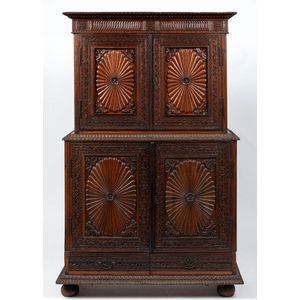
Anglo-Indian Teak Two Tier Cabinet, circa 1850
An Anglo-Indian teak two tier cabinet, circa 1850, with a projecting cornice above a wave carved frieze with paterae, the ornately bordered cupboards enclosing sunburst motifs, the extended base of conforming design and raised on concealed squashed bun…

Anglo-Indian Silver Tankard with Hunting Scene by Monohur Dutt
Late 19th century Anglo-Indian silver tankard. By Monohur Dutt, Calcutta. Repousse decoration of hunting scene. Cartouche with monogram 'M.G.H' height 7 cm, width 139g)
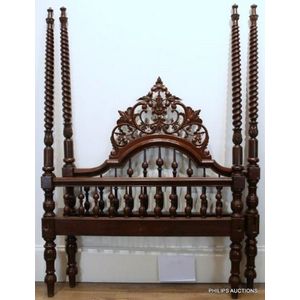
19th Century Anglo-Indian Hardwood Four-Post Bed with Floral Carvings
An antique Anglo-Indian hardwood four-post bed, late 19th century profusely carved throughout with flowers, trailing foliage and C-scrolls, with an arched headboard with above turned spindles, with spiral-turned tapering posts with capitals, plain sides…

Geometric Inlaid Ivory Desk Stand with Ceramic Wells
Vizagapatam inlaid ivory desk stand, oblong shape with geometric and rosette designs, twin pen recesses, central lidded niche and two detachable ceramic wells (faults)

Early 19th Century Anglo-Indian Rosewood Armchair with Carved Details
An Anglo-Indian rosewood armchair, early 19th century, the relief carved top rail centred with a palmette and flanked by acanthus scrolls, the reeded uprights with leaf carved sides, the leather upholstered back and seat flanked by foliate scrolled arms…

Anglo-Indian Padouk and Cedar Pembroke Table, circa 1830
An antique Anglo-Indian padouk and cedar two drawer Pembroke table with reeded and acanthus carved legs, circa 1830, 73 cm high, 59 cm wide (extends to 104 cm open), 91 cm deep

Ivory Miniature Chess Set in Anglo-Indian Bone Fretwork Chest
Ivory miniature chess set in chest, detailed miniature chess set, housed in Anglo-Indian bone fretwork clad chest with lion paw feet ('A/F' some loss to fretwork), width 11 x 10 cm
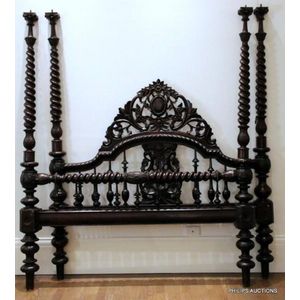
19th Century Anglo-Indian Hardwood Four-Post Bed with Intricate Carvings
An antique Anglo-Indian hardwood four-post bed, late 19th century profusely carved throughout with foliage, flower heads and C-scrolls, the arched headboard with pierced oval panel above spindles, with plain sides, spiral-turned tapering posts with…
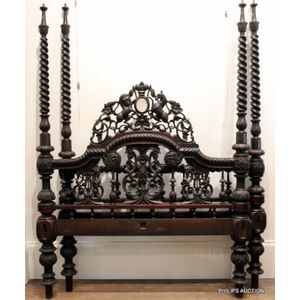
19th Century Anglo-Indian Carved Hardwood Four-Post Bed
An antique Anglo-Indian hardwood four-post bed, late 19th century profusely carved throughout with flowers, trailing foliage and scrolls, the arched headboard with pierced panel with small mirror crest flanked by a lion and horse above spindles, with…

Anglo-Indian .950 Silver Jardiniere with Vishnu Avatars, circa 1900
An Anglo-Indian .950 silver jardiniere, marked 'Silver', X-ray tested .950 silver, circa 1900, the large footed bowl or jardiniere, finely repousse and chased in relief with a narrative of the avatars of Vishnu in fourteen shaped vignettes encircling, the…
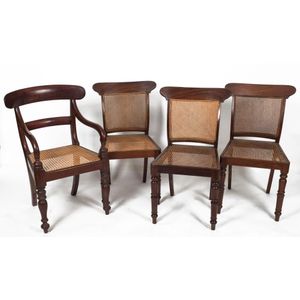
19th Century Anglo-Indian Antique Chairs Set, Three Standards, One Carver
Four antique Anglo-Indian chairs, comprising three standards and one carver, 19th century

19th Century Anglo-Indian Hardwood Carved Four-Post Bed
An antique Anglo-Indian hardwood four-post bed, late 19th century profusely carved throughout with flowers, foliage and scrolls, the arched headboard with pierced panel with small mirror crest flanked by a lion and horse above spindles, with spiral-turned…
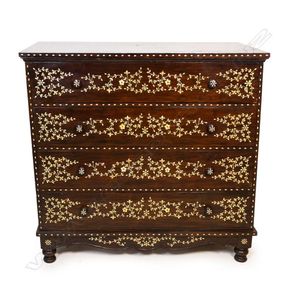
Anglo-Indian Bone Inlay Chest of Drawers with Turned Handles
An old Anglo-Indian chest of drawers, four full width drawers with small turned handles, raised on small bun feet with decorative apron. The chest exterior profusely decorated with bone inlay. 102 x 51 x 96.5 cm.
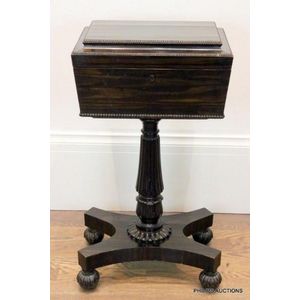
19th Century Anglo-Indian Ebony Veneer Teapoy in William IV Style
An Anglo-Indian ebony veneer teapoy, 19th century the William IV style sarcophagus form teapoy with beaded rims, raised on a carved column and quadripartite platform ending in fluted bun feet, the interior adapted as a work box. Height 76 cm, width 42 cm,…

19th Century Anglo-Indian Hardwood Four-Poster Bed with Intricate Carvings
An antique Anglo-Indian hardwood four-poster bed, 19th century the arched headboard profusely carved and pierced with foliage and scrolls above spindles, with spiral-turned tapering posts, the sides and backboard plain with spindles, all raised on large…

Georgian Anglo-Indian Silver Teapot, Calcutta, C. 1820, Provenance Lawford
A rare Georgian period Anglo-Indian silver teapot, melon shaped with leaf and scroll decorations, scroll feet, pumpkin finial, Hamilton and Co. Calcutta, & Lb and Co. Calcutta, C. 1820, W. 1000g approx. It was buried along with other items during the…

Anglo-Indian Sideli Box with Micromosaic Medallions and Starburst Pattern
Late 19th century Anglo-Indian Sideli box, of rectangular form, decorated in a veneered ivory and sandalwood starburst pattern with micromosaic medallions, raised on four ball feet, 6 cm x 13 cm x 10 cm published: antique boxes: inside and out, colour…
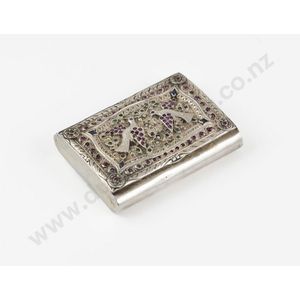
Anglo-Indian Silver Gem-Studded Snuff Box with Bird Motif
A 19th century Anglo-Indian silver gem studded snuff box, the hinged cover embossed with nesting birds all set with rubies, emeralds, sapphires and half pearls 8 cm long

Anglo-Indian 22ct Tortoise Shell Gem Cross Pendant/Brooch Ruby Turquoise
Victorian Anglo-Indian 22ct tortoise shell and gem cross pendant/brooch, tortoise shell base mounted with fine filigree gold work studded with rubies, turquoise and pearls with cross pendant drop 8 cm overall length (missing brooch pin)

Anglo-Indian Padouk Tilt Top Table, 1830-1840, Carved Bullnose Edging
An Anglo-Indian padouk tilt top table, 1830-1840, with relief carved bullnose edging above a carved and knopped standard to a tripod platform base on squashed bun feet, 74 cm high, 60 x 60 cm

Anglo-Indian Padouk Tilt Top Table, 1830-1840, Carved Design
An Anglo-Indian padouk tilt top table, 1830-1840, with relief carved egg and dart edges above a carved and knopped standard to a tripod platform base with squashed bun feet, 73 cm high, 59 cm wide, 60 cm deep

19th Century Anglo-Indian Rosewood Two Tier Spiral Twist Cabinet
An Anglo-Indian two tier rosewood cabinet, 19th century, with arched fielded panels to the cupboards flanked by spiral twist pillars, 210 cm high, 126 cm wide, 54 cm deep

19th Century Anglo-Indian Hardwood Four-Post Bed with Carved Details
An Anglo-Indian hardwood four-post bed, second half 19th century, the turned, reeded, and carved posts supporting moulded and dentilated curtain rails above the shaped headboard with a foliate carved and pierced crest atop a gallery of spindles and the…

19th Century Anglo-Indian Rosewood Dining Chairs Set of Six
Anglo-Indian harlequin set of six rosewood dining chairs. 19th century.

1835 Anglo-Indian Padouk Tilt Top Centre Table, Carved Pedestal
Anglo-Indian antique padouk tilt top centre table with impressively-carved pedestal base, circa 1835. 75 cm high, 152 cm diameter.

Anglo-Indian Rosewood Demi-Lune Side Table with Intricate Carvings
A late 19th century Anglo-Indian rosewood demi-lune side table, the border to the top and the apron extensively carved with Indian plants, birds and animals, the back carved with conforming plants and flowers, raised on four substantial legs with…

19th Century Anglo-Indian Hardwood Four-Post Bed with Intricate Carvings
An antique Anglo-Indian hardwood Four-Post bed, late 19th century profusely carved throughout with flowers, foliage and scrolls, the arched headboard with pierced panel with small mirror crest flanked by a lion and horse above spindles, with spiral-turned…

19th Century Anglo-Indian Rosewood Bergere Chair with Intricate Carvings
A magnificent intricately carved 19th century Anglo-Indian rosewood bergere chair of exhibition quality the horseshoe shaped profusely carved and pierced floral & foliate back continuing to the arms with cathead carved terminals, having shaped lower…

Anglo-Indian Carved Workbox with Claw Feet, 19th Century
An Anglo-Indian workbox, superbly carved on all sides, with claw feet and compartmented lift out tray fitted with lids, early to mid 19th century, 18 cm high, 32.5 cm wide, 25.5 cm deep

Sterling Silver Collection: Stand, Labels, Inkwell from 19th-20th Century
A group of sterling silver itemsvarious makers and dates, early 19th - 20th century, comprising a small shaped bead edgestand, Sheffield, 1908; an Anglo-Indian sherry label by Hamilton & Co., a Georgian madeira label with mark for Tr, and; a plain and…

19th Century Anglo-Indian Hardwood Four-Post Queen Bed
An antique Anglo-Indian hardwood Four-Post Queen bed, 19th century of Queen bed size, profusely carved throughout with flowers, foliage, scrolls and lion heads, the arched headboard with pierced panel below a flowering vase flanked by foliate pillars and…

Anglo-Indian Silver Card Case with Intricate Scene Decorations
Early 20th century Anglo-Indian silver card case, unmarked, of shaped rectangular form, decorated with scenes of figures, foliage and animals, total weight 137gm, 10 cm x 7 cm. Provenance: collection of the late Fredric Sinfield, Sydney NSW, 1938 - 2008

Anglo Indian Vizagapatam Tortoiseshell Box with Ivory Inlay
19th century Anglo Indian Vizagapatam box, tortoiseshell with inlaid and overlaid ivory decoration, incised and painted flowers and leaves, on ivory lion paw feet, plain wooden interior, 11.7 cm long, 5.5 cm high, 7 cm wide
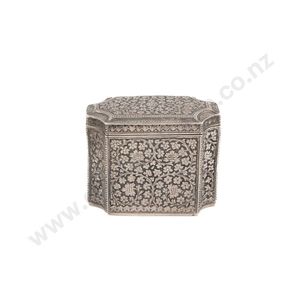
19th Century Anglo-Indian Silver Tea Caddy with Ornate Floral Decoration
Fine quality 19th century Anglo-Indian silver tea caddy, rectangular shape with hinged lid, concave corners, traditional ornate allover floral decoration, 183 grams

Anglo-Indian Rosewood Military Chest with Brass Fittings
A vintage Anglo-Indian rosewood military style chest, traditional configuration with two short over three full width drawers, brass fittings, height 95 cm.

Anglo-Indian Carved Corner Whatnot, Late 19th Century
An Anglo-Indian carved corner whatnot, late 19th early 20th century the tapered and four tiered shelf with heavily carved and reticulated decorative fretwork, raised on short cabriole legs. Height 144 cm, width 75 cm, depth 49 cm
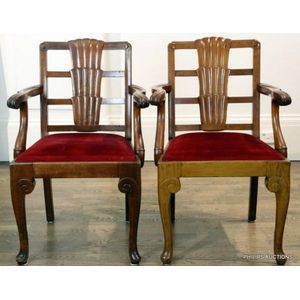
Anglo-Indian Padouk Carvers with Red Velvet Upholstery
A set of four Anglo-Indian padouk carvers, circa 1900 the four carvers with a shaped top rail above ladderback with lobed central splat and drop-in seat upholstered in red velvet, scrolled arms and legs. Height 87 cm, width 45 cm, depth 36 cm

Teak Anglo-Indian Campaign Secrétaire Chest
A 19th century teak Anglo-Indian campaign secretaire chest, fitted with four drawers, the secretaire drawer with well fitted interior, brass mounts. Height: 149 cm. Width:110 cm. Depth: 44 cm.

19th Century Anglo-Indian Trinket Box with Ivory and Bone
Anglo-Indian ivory, bone, and tortoise shell trinket box a 19th century Anglo-Indian, tortoiseshell, ivory and bone trinket box, the bone pierced to resemble lacework or tracery, the lid with a palm tree centrepiece and foliate designs to the bone…
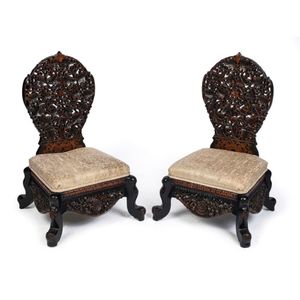
19th Century Anglo-Indian Ebony Nursing Chairs
A pair of antique Anglo-Indian ebony nursing chairs with ornately carved and pierced decoration, 19th century, 89 cm high

1825 Anglo-Indian Carved Ebony Cello Chairs
A pair of Anglo-Indian cello chairs, solid carved ebony, circa 1825

Anglo-Indian Carved Cedar Cabinet, 20th Century
An Anglo-Indian carved cedar cabinet, 20th century, 158 cm high, 120 cm wide, 43 cm deep
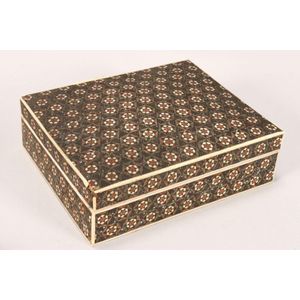
Anglo-Indian Sadeli Box and Cover
Anglo-Indian sadeli box and cover, of rectangular form, slight a/f, 4.5 cm x 12 cm x 10 cm
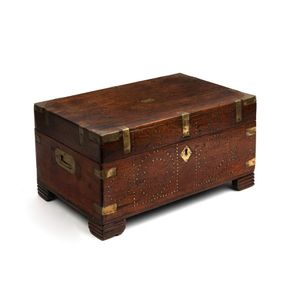
Brass-Bound Mahogany Writing Box, Signed S.C. Dass
An Anglo-Indian brass bound mahogany writing box, 19th century, with brass studding, mounts and lock-plates, signed S. C. Dass, 23 cm high, 45 cm wide, 30 cm deep
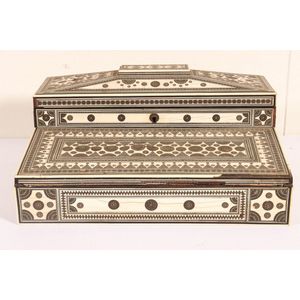
Anglo-Indian Sadeli Writing Compendium
Writing compendium, early 19th century Anglo-Indian sadeli, Visagapatan compendium, bone inlay with indigo velvet writing Mat, width 39 cm, (som warping and missing pieces)

19th Century Anglo-Indian Bone Cabinet
An Anglo-Indian double-sided cabinet with bone and penwork decoration, 19th century, 61 cm high, 75 cm wide, 35 cm deep

Antique Teak Travel Trunk with Fitted Interior
An Anglo-Indian teak travel trunk, interior attractively fitted with lift-out tray and carved compartments, with original brass escutcheons and bindings, a very attractive piece, early 19th century. 50 cm high, 82 cm wide, 48 cm deep
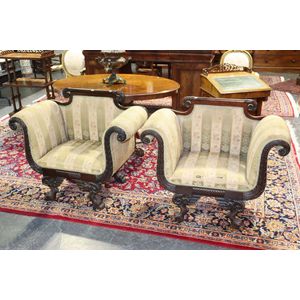
Regency-style Anglo-Indian Acanthus Armchairs with Lion Paw Feet
Rare pair of Anglo-Indian armchairs, carved in hardwood, decorated with acanthus leaves, rosettes with lion paw feet in the Regency manner with scrolled arms

Anglo-Indian Stag Antler Document Box
19th century Anglo-Indian Vizagapatam stag antler and sandalwood document box and cover, of rectangular form, set with central panel, surrounded by a sunray paneled motif and paneled sides, opening to fitted wood interior, length 26 cm
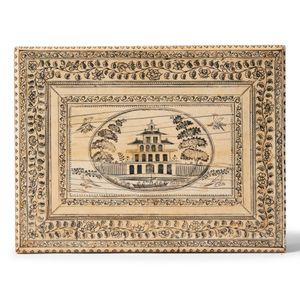
Intricate Indian Bone Jewellery Box
An Indian Vizagapatam bone jewellery box, 18th early 19th century, decorated with black-stained incised intricate scrolling foliage and foliate motifs to the sides and an oval cartouche containing a mansion to the top. Later red velvet lining. 9.5 cm high…
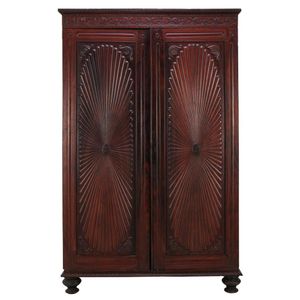
19th Century Rosewood Press Cupboard with Fan-Burst Motif
An Anglo-Indian rosewood press cupboard, mid 19th century, the moulded and carved cornice and frieze above a pair of panelled doors, each carved with a fan-burst motif, on turned feet, 198 cm high, 128 cm wide, 48.5 cm deep

Victorian Anglo-Indian Silver Filigree Button Set
Cased set of five Victorian Anglo-Indian silver filigree buttons
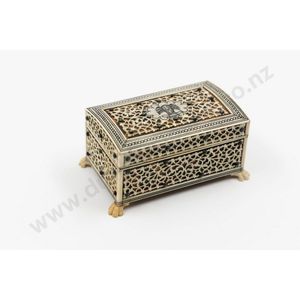
Pierced Bone Overlay Trinket Box with Claw Feet
Anglo-Indian sandalwood and tortoise shell trinket box all finely pierced overlay of bone on claw feet 8.5 cm length

Anglo-Indian Teak Campaign Chest of Drawers
An Anglo-Indian teak campaign chest of drawers, early to mid 19th century 104 cm high, 107 cm wide, 48 cm deep

Anglo-Indian Ebony and Bone Writing Slope with Inlay Decoration
Antique Anglo-Indian ebony and bone writing slope traditional inlaid bone decoration to exterior, lid opening to fitted interior, with decorated lidded sections for inkwells, width 38 cm. Note: condition is 'As inspected.'.
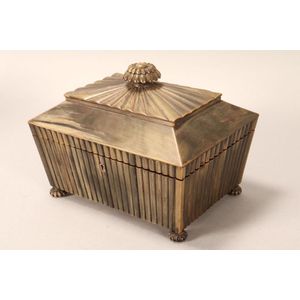
Anglo-Indian Horn Sewing Box with Ivory Interior
Stunning Anglo-Indian sewing box, in horn, of fluted sarcophagus form, opening to reveal a beautifully fitted interior in ivory and horn, with cotton reels and pin cushion, 21 cm x 27 cm x 20 cm

Anglo-Indian Stained Ivory Chess Set with Ornate Details
A 19th century Anglo-Indian stained ivory chess set green stained and natural, the king and queen pieces with pierced mace capitals (king issuing from a double knop, queen issuing from a mural crown), the bishops with ornately detailed mitres. Some slight…

Ornate Anglo-Indian Shaving Mirror
Anglo-Indian shaving mirror with ornate inlay, 146 cm high, 57 cm wide

19th Century Anglo-Indian Carved Ebony Armchair
An Anglo-Indian carved ebony armchair, mid 19th century, the relief carved top rail centred with a scallop shell and scrolling acanthus between leaf carved uprights descending to scroll carved arms and seat rail, having caned seat and back on winged lion…

19th Century Carved Ebony Armchair
An Anglo-Indian carved ebony armchair, mid 19th century, the relief carved top rail centred with an anthemion flanked by leaf scrolls and a pair of volutes, the moulded uprights descending to scrolled arms terminating in a patera, the seat rail with…

Anglo-Indian Mythical Creature Carved Rosewood Davenport
A highly decorative Anglo-Indian carved rosewood davenport. 19th century, the serpentine fronted davenport, on ornately carved mythical creature supports, the openwork high back fitted with open shelf and five small drawers, the base with cupboard door,…

Anglo-Indian Ebony Caned Settee, circa 1830
A fine Anglo-Indian ebony caned settee. Ceylon, circa 1830, the impressive caned settee, carved throughout with bold foliage, rosettes and reeding to the shaped back and scrolled arms, with cream loose cushions, on scrolling legs terminating in claw feet,…
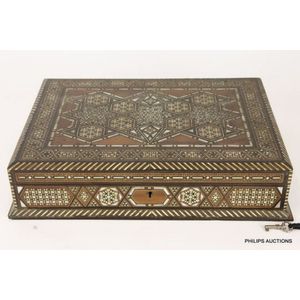
Anglo-Indian Marquetry Box
An Anglo-Indian marquetry inlaid box. Early 20th century the rectangular document box with chamfered edges, finely inlaid with intricate tessellated motifs worked in vari-coloured timbers, bone and mother of pearl to the exterior with a further inlaid…

19th Century Anglo-Indian Carved Mahogany Fold-Over Table
An Anglo-Indian carved mahogany fold-over table, 19th century, 73 cm high, 76 cm wide, 38 cm deep
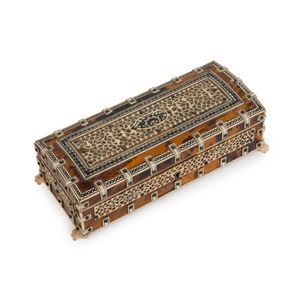
Antique Anglo-Indian Jewellery Casket with Velvet Interior
An Anglo-Indian antique jewellery casket, tortoiseshell bone and ivory with velvet interior, 19th century, 5.5 cm high, 19 cm wide, 8.5 cm deep

Anglo-Indian Brass-Bound Teak Trunk, Late 19th Century
An Anglo-Indian brass bound teak trunk, late 19th century, 53 cm high, 101 cm wide, 50 cm deep

Anglo-Indian Octagonal Floral Carved Occasional Table
An Anglo-Indian octagonal occasional table with carved floral motif, 19th century, 55 cm high, 45 cm wide, 45 cm deep

Anglo-Indian Padouk Centre Table, Circa 1830
A fine Anglo-Indian centre table, impressively carved padouk, circa 1830, 76 cm high, 147 cm diameter

19th Century Anglo-Indian Teak Blanket Box
An Anglo-Indian teak blanket box, 19th century, 50 cm high, 91 cm wide, 45 cm deep

Anglo-Indian Sadeli Micro Mosaic Card Case
19th century Anglo-Indian sadeli card case, of rectangular form with cover, decorated in, silver and micro mosaic on a sandalwood body, a/f (some minor areas missing mosaic) 10 cm x 7.5 cm

19th Century Ebony Side Chairs with Grey Silk Upholstery
A pair of Anglo-Indian ebony side chairs, 19th century, each with a pierced and carved crest rail above a drop-in seat upholstered in grey silk brocade

19th Century Anglo-Indian Ebonised Collectors Cabinet
An Anglo-Indian ebonised Collectors cabinet, 19th century, carved with flowering vine borders to each edge and side, the twin doors carved with mandalas, raised on squat bun feet, 99 cm high, 113 cm wide, 52 cm deep

19th Century Anglo-Indian Ivory Writing Slope
Large 19th century Anglo Indian ivory, ebony and sadeli mosaic writing slope, c.1840, of deep rectangular form, set with central circular motif, with radiating line work, accented with a circular star motifs, the interior opening to fitted interior, with…
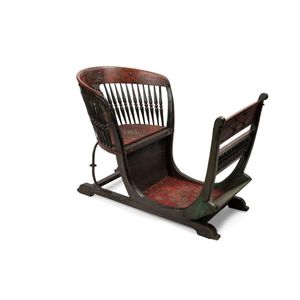
Antique Anglo-Indian Sedan Chair, Rare 1800 Provenance
Palki or Tonjon antique Anglo-Indian sedan chair, circa 1800, rare. 85 cm high, 112 cm wide, 70 cm. Provenance: The Judith Heaven an the late Barrie Heaven collection, South Australia.

Carved Anglo-Indian Jewellery Casket with Diamond Inside
Exquisite jewellery casket, extensively carved Anglo-Indian box with internal compartments - has minute diamond taped to inside lid
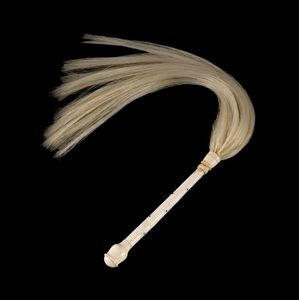
Anglo-Indian Ivory Fly Whisk from Dame Nellie Melba's Collection
Late 19th century Anglo-Indian ivory fly Whisk. Provenance: Dame Nellie Melba. Smith & Singer, property from the collection of Dame Nellie Melba, 31st March 2015 (lot 143). Estate late John Schaeffer.

Anglo-Indian Ivory Walking Stick from Melba's Collection
Late 19th century Anglo-Indian ivory walking stick. Provenance: Dame Nellie Melba. Smith & Singer, property from the collection of Dame Nellie Melba, 31st March 2015 (lot 142). Estate late John Schaeffer.

Anglo-Indian Cedar Centre Table, 1850
An Anglo-Indian cedar centre table; circa 1850, the circular tilt top on a leaf carved baluster pedestal on moulded and gadrooned socle, the triform platform base terminating in three scroll feet. Height 77 cm, diameter 132 cm

19th Century Anglo-Indian Oak Coffer
An Anglo-Indian oak coffer, 19th century, the hinged lid above a geometric carved frieze and plinth base, 53 cm high, 146 cm wide, 55 cm deep

Anglo-Indian Carved Coconut Pedestal Jar with Figural Finial
19th century Anglo-Indian carved coconut pedestal jar and cover, the cover set with figural finial, the body carved with panels of figures and peacock, raised on a figural support above a stepped circular base, height 22.5 cm

Anglo-Indian Ebony Dressing Box with Intricate Carvings
19th century Anglo-Indian ebony dressing box, of rectangular form, continuously carved with intricate floral and foliate motifs, the hinged cover opening to reveal mirror and removable compartments lined with red velvet, with sandalwood borders, raised on…

Anglo-Indian Carved Sewing Box with Sandalwood Compartments
19th century Anglo-Indian sewing box, of handsome proportions in hardwood, continuously carved with animals, figures, flowers and foliate scrolls, the hinged cover opening to reveal mirror surrounded by a carved sandalwood frame, with lidded sandalwood…

Ebony Dome-Topped Anglo-Indian Compendium Box
An Anglo-Indian compendium dome topped box, ornately carved in ebony, mid 19th century, 15 cm high, 25 cm wide, 13 cm deep

18th Century Anglo-Indian Padouk Chest on Chest
An Anglo-Indian Georgian padouk chest on chest, late 18th century, 180 cm high, 111 cm wide, 55 cm deep

Framed Anglo-Indian Ivory Paintings Set
A set of three framed Anglo-Indian hand painted works on ivory 18 cm x 13 cm and 12 cm x 12 cm
 Loading more...
Loading more...